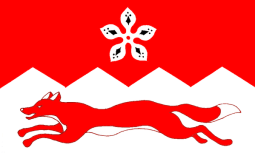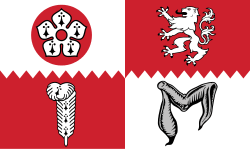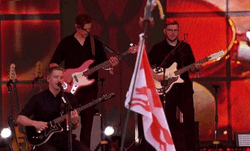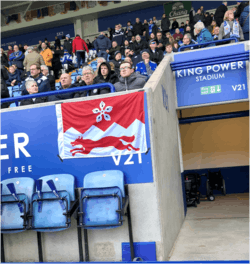Flag of Leicestershire
Leicestershire is the last remaining English county without a registered flag. One proposal, the "fox and cinquefoil" design, combines several themes and devices found on civic arms, club badges and organisational emblems throughout the county, and is favoured by a contingent hoping to see the county added to the Flag Institute's UK Flags Registry. The symbolism incorporates a field divided red and white; a zigzag or serrated division; a floral depiction termed a cinquefoil; and a running fox.
 | |
| Proportion | 3:5 |
|---|---|
| Adopted | Not yet adopted |
Design
The red and white divided field was a pattern borne by the de Montfort earls of Leicester, whose family emanated from Normandy. Simon de Montfort, the sixth earl, came from France to claim lands which had belonged to his ancestors. He returned to Gascony in 1248 to settle King Henry III's unruly lands, which caused the locals to petition the king against him. He was tried for misgovernment at Westminster but won his case. De Montfort and other barons were becoming disaffected with the King’s irresponsible rule, they arrived fully armed at a Great Council meeting, where, led by de Montfort, they forced the King to accept reforms, the Provisions of Oxford. A Parliament was to be called and a permanent council of fifteen, of whom de Montfort was one, was to control the King's actions. On 14 May 1264 de Montfort's army engaged the King's on the South Downs north of Lewes, Sussex and victorious, he became de facto ruler of England. After a rule of just over a year, de Montfort met his death at the hands of forces loyal to the King, at the Battle of Evesham. He is regarded today as one of the progenitors of modern parliamentary democracy.
Armorial banner



The coat of arms of Leicestershire County Council in flag form is often marketed as the county flag of Leicestershire, but it represents only the council and flying it requires their permission. This council additionally, does not administer the whole county, so the symbols of the council cannot represent the entire county. It is also worth noting that the design does not include, probably the single most definitive county emblem, the running fox.